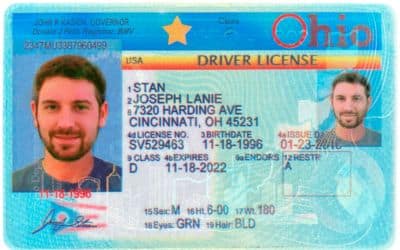Overview of Ohio ID scanning laws
Ohio has 6 laws which we consider relevant to ID verification, in addition to other laws which may related to age verification, identity verification, KYC, privacy, and biometrics.
Can you scan IDs in Ohio?
Ohio law specifically regulates a business’s practice of scanning driver’s licenses in the context of selling age-restricted goods such as alcohol, tobacco, and pseudoephedrine/ephedrine. Otherwise, there is no law generally regulating a business’s practice of scanning IDs.
Can you save data from a scanned ID in Ohio?
Yes, but there are regulations in the cases of selling alcohol, tobacco, and pseudoephedrine/ephedrine.
Does Ohio offer affirmative defense for ID scanning?
Yes. Ohio has extremely explicit affirmative defense laws for ID scanning for alcohol sales, tobacco sales, and sales of ephedrine and pseudoephedrine. Some jurisdictions additionally outline affirmative defense related to ID scanning (example: Botkins, OH).
What types of IDs does Ohio issue?
Ohio issues drivers licenses and state IDs, including REAL ID, and CDLs. Ohio does not issue non-domiciled CDLs. Ohio also has an active mobile drivers license (mDL) available in Apple Wallet.
Individual Ohio ID verification laws
Age verification for alcohol sales
Ohio allows for ID scanning for alcohol sales, but only allows for the retention of the customer’s name, date of birth, expiration date, and drivers license number.
Age verification for tobacco sales
Ohio allows for ID scanning for tobacco sales, but only allows for the retention of the customer’s name, date of birth, expiration date, and drivers license number.
Increased fines for repeated tobacco sales to minors
This bill would increase fines for Ohio businesses repeatedly selling tobacco to minors, both in-person and online.
Age verification for pornography
Ohio law requires age verification for any organization selling or providing material that is “obscene or harmful to juveniles.”
Age verification for ephedrine/pseudoephedrine
Ohio allows for ID scanning for ephedrine and pseudoephedrine sales, but only allows for the retention of the customer’s name, date of birth, expiration date, and drivers license number.
Age verification for social media
An Ohio federal judge placed a temporary restraining order on a law that required parental approval for children under 16 to create social media and online gaming accounts.
Data privacy laws in Ohio
Ohio does not have any general data privacy provisions. The Ohio Personal Privacy Act has been proposed to establish consumer data privacy protections.
Ohio’s Data Protection Act provides incentives for businesses to strengthen their cybersecurity.




